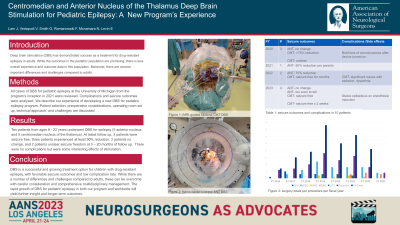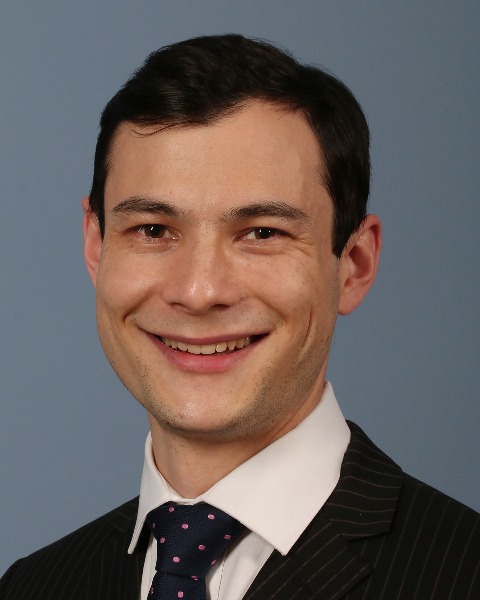Centromedian and Anterior Nucleus of the Thalamus Deep Brain Stimulation for Pediatric Epilepsy: A New Program’s Experience
Centromedian and Anterior Nucleus of the Thalamus Deep Brain Stimulation for Pediatric Epilepsy: A new Program’s Experience
Friday, April 21, 2023


Jordan Lam, MBBS (he/him/his)
Resident
University of Michigan
Ann Arbor, Michigan, United States
ePoster Presenter(s)
Introduction: Deep brain stimulation (DBS) has demonstrated success as a treatment for drug-resistant epilepsy in adults. While the outcomes in the pediatric population are promising, there is less overall experience and outcome data in this population. Moreover, there are several important differences and challenges compared to adults.
Methods: All cases of DBS for pediatric epilepsy at the University of Michigan from the program’s inception in 2021 were reviewed. Complications and seizure outcomes were analyzed. We describe our experience of developing a new DBS for pediatric epilepsy program. Patient selection, preoperative considerations, operating room set up, technical approach, and challenges are discussed.
Results: Ten patients from ages 8 - 22 years underwent DBS for epilepsy (5 anterior nucleus and 5 centromedian nucleus of the thalamus). At latest follow up, 3 patients were seizure free, three patients experienced at least 50% reduction, 2 patients no change, and 2 patients unclear seizure freedom at 3 – 20 months of follow up. There were no complications.
Conclusion : DBS is a successful and growing treatment option for children with drug-resistant epilepsy, with favorable seizure outcomes and low complication rate. While there are a number of differences and challenges compared to adults, there can be overcome with careful consideration and comprehensive multidisciplinary management. The rapid growth of DBS for pediatric epilepsy in both our program and worldwide will yield further insight and longer-term outcomes.
Methods: All cases of DBS for pediatric epilepsy at the University of Michigan from the program’s inception in 2021 were reviewed. Complications and seizure outcomes were analyzed. We describe our experience of developing a new DBS for pediatric epilepsy program. Patient selection, preoperative considerations, operating room set up, technical approach, and challenges are discussed.
Results: Ten patients from ages 8 - 22 years underwent DBS for epilepsy (5 anterior nucleus and 5 centromedian nucleus of the thalamus). At latest follow up, 3 patients were seizure free, three patients experienced at least 50% reduction, 2 patients no change, and 2 patients unclear seizure freedom at 3 – 20 months of follow up. There were no complications.
Conclusion : DBS is a successful and growing treatment option for children with drug-resistant epilepsy, with favorable seizure outcomes and low complication rate. While there are a number of differences and challenges compared to adults, there can be overcome with careful consideration and comprehensive multidisciplinary management. The rapid growth of DBS for pediatric epilepsy in both our program and worldwide will yield further insight and longer-term outcomes.
